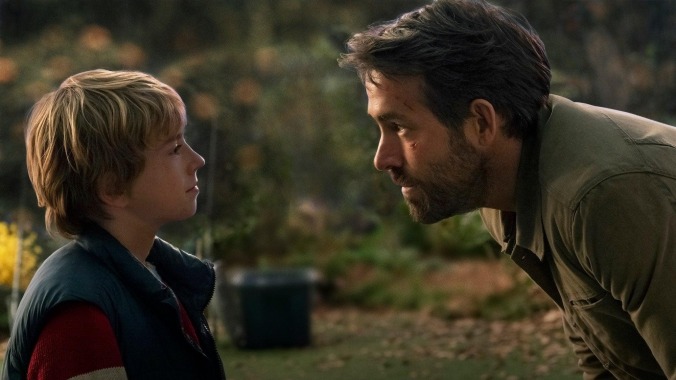Time-travel adventure The Adam Project sends the Free Guy team to middlebrow blandness
Despite the support of a terrific ensemble cast, Ryan Reynolds and director Shawn Levy fail to strike gold with this uninspiring retread of time-travel clichés

Shawn Levy is an interesting filmmaker—at the very least as a case study if not a creative force, though maybe that too. A workhorse director (13 films in the last two decades) and prolific, very hands-on producer (the zeitgeist hit Stranger Things, of course, but also no less than an additional 18 movies, including The Spectacular Now and Arrival), Levy has nonetheless mostly avoided both the rewards and attendant burdens of mainstream, brandname auteur recognition.
That seemed to potentially change last year with the COVID-delayed release of the action comedy Free Guy, which both delighted audiences and amused critics, en route to a $332 million worldwide theatrical gross—the highest of 2021 for a movie that wasn’t a sequel and/or comic book adaptation. Levy’s latest effort, the science-fiction-tinged The Adam Project, reunites him with leading man Ryan Reynolds in the story of a rogue time traveler who, attempting to save the future, accidentally lands in 2022 and connects with a younger version of himself. Unfortunately, it represents a creative step backward for Levy as easily forgotten filler entertainment.
The film opens in 2050 with Adam Reed (Reynolds) fleeing in a stolen fighter jet to make a wormhole jump back in time. Missing his target of 2018, he comes into contact with his 12-year-old self (Walker Scobell), who lives alone with his mother Ellie (Jennifer Garner), after his father Louis (Mark Ruffalo) died in a car accident a year-and-a-half earlier. Since “time jets” are coded to one’s DNA, the Adams pair up, setting out to find his (their?) missing wife Laura (Zoe Saldaña) while also staying one step ahead of Maya Sorian (Catherine Keener), Louis’ villainous partner and research funder.
The main problem with The Adam Project isn’t so much that its themes and plotting recall other, better movies, though there is certainly some of that. It’s that the movie isn’t smart or ambitious enough to meaningfully engage with the ideas that would make it stick in the minds of viewers. There’s not much applied intellectual rigor here, no convincingly carved dramatic through lines that speak to who these characters actually are.















![HBO teases new Euphoria, Larry David, and much more in 2026 sizzle reel [Updated]](https://img.pastemagazine.com/wp-content/avuploads/2025/12/12100344/MixCollage-12-Dec-2025-09-56-AM-9137.jpg)
























